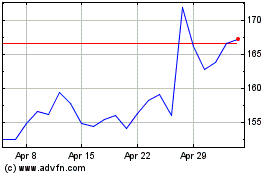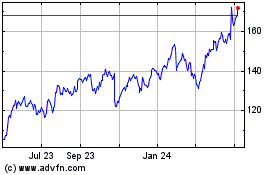By Nick Kostov and Sam Schechner
Europe's new privacy law appears to be helping tech giants --
for now.
The General Data Protection Regulation, or GDPR, which went into
effect across the European Union last year, has pushed marketers to
spend more of their ad dollars with the biggest players, in
particular Alphabet Inc.'s Google and Facebook Inc., ad-tech
companies and media buyers say.
One year on, how different countries will enforce the regulation
is still being determined, and experts say that a uniform standard
for the use of data in digital advertising is unlikely to
materialize for a number of years. That's pushing some firms to
concentrate their digital ad budgets with fewer tech giants, whom
they trust not to run afoul of the rules. Violators of GDPR face
fines of up to EUR20 million (about $23 million), or 4% of their
global revenue, whichever is higher.
The rules have also made it harder for third parties to collect
lucrative personal information like location data in Europe to
target ads. This gives the tech giants another advantage: They have
direct relationships with consumers that use their products,
allowing them to ask for consent directly from a much larger pool
of individuals.
"GDPR has tended to hand power to the big platforms because they
have the ability to collect and process the data," says Mark Read,
CEO of advertising giant WPP PLC. It has "entrenched the interests
of the incumbent, and made it harder for smaller ad-tech companies,
who ironically tend to be European."
In the longer term, however, it remains to be seen whether the
law is going to force a substantial change in Google's or
Facebook's business model in a way that could loosen their grip on
the digital ad market, such as by restricting their ability to
collect or employ their users' personal data. A series of cases
filed against Google and Facebook in Ireland and in other EU
countries could result in rulings that portions of their core
advertising businesses are in violation of the EU law.
French data regulator CNIL fined Google EUR50 million -- the
biggest penalty so far under the new EU privacy law -- charging the
company with "lack of transparency, inadequate information and lack
of valid consent regarding ads personalization." Google is
appealing the decision. Ireland's Data Protection Commission, which
says it now has 11 investigations open into Facebook Inc. units,
last month also opened an investigation into Google over how it
handles personal data for the purpose of advertising.
A Facebook spokesman declines to address GDPR's impact on the
company's market position. But Facebook Chief Operating Officer
Sheryl Sandberg at a conference in February, said: "The truth is
it's actually easier for big companies like Facebook, or other big
competitors, to put in place things that adhere to regulation than
it is for startups. If I think back to Facebook 10 years ago, GDPR
would have been much harder for us then than it was now."
A spokesman for Google declines to comment. In the past, the
company has said it has invested significantly to comply with the
GDPR.
Specific data on the impact of GDPR are hard to come by, but
some analysts point to Google and Facebook's revenue as a reference
point. In 2018, both appeared to have outgrown the digital
advertising market in the region, according to a comparison of
company filings with regional estimates, suggesting they continued
to gain share. Facebook's revenue from ads shown in Europe rose 40%
in 2018. Google's revenue in Europe, the Middle East and Africa --
the vast majority of which comes from advertising -- rose 20% last
year.
By comparison, Europe's digital advertising market grew by only
14% over the same period, according to estimates from IAB Europe,
an online-ad trade group.
"Anecdotally, Facebook and Google benefited, and what we see in
the data reinforces that," says Brian Wieser, strategy chief at
WPP's media-agency conglomerate GroupM.
Meanwhile, some smaller firms have faced obstacles in the EU.
Before the GDPR went into effect last year, Los Angeles-based
location-data firm Factual Inc. stopped offering some of its
services in Europe because executives didn't think the company
would be able to gather data with proper consent from individuals.
A year later, those products are still on pause in Europe, while
Google and Facebook -- which have direct consumer relationships --
offer location-based advertising services.
"GDPR put more power and more control into the hands of the
duopoly," says Brian Czarny, Factual's chief marketing officer, who
says his company is only now preparing to reintroduce suspended
services in some EU countries. "They have the ability to collect a
lot of data from their apps and the ability to weather the legal
side of things as well."
Paris-based Teemo, which uses location data to help marketers
target their ads, was one of the first companies to be rebuked
under the GDPR. France's privacy regulator ordered the company to
stop processing individuals' location data without their informed
consent. The company has been rebuilding its business to be
compliant with GDPR. While it is growing, revenue from its data
business isn't expected to reach its pre-GDPR level until this
summer, says CEO Benoit Grouchko.
"If you work with a small data company, it's not as reassuring,"
Mr. Grouchko says. "With Google and Facebook you know you're not
taking a risk as an advertiser."
The marketplace is still waiting on a set of high-stakes
decisions by regulators that will show how they plan to interpret
the GDPR -- and how courts will handle likely appeals. A new series
of complaints by privacy activists allege the machinery that drives
real-time bidding for online ads based on users' behavior is a
violation of the law. Other complaints allege that the consent
users are giving to some big companies isn't "freely given" as the
law requires. If regulators and courts agree, that could lead to
much broader impact.
Alessandro Acquisti, a professor of information technology and
public policy at Carnegie Mellon University in Pittsburgh, says it
is too early to tell whether the GDPR will end up favoring big
players -- or whether it will weaken their businesses, making them
easier to topple.
"We should be extremely cautious about distinguishing between
short-term effects and long-term effects," he says. "Until we see
how cases will be litigated and their outcomes, and until we do
empirical studies about downstream impacts, there is no way to
resolve these opposing claims."
Regardless of the impact, it is likely that U.S. advertisers
will have to contend with similar rules soon. The California
Consumer Privacy Act is set to take effect next year, and lawmakers
in other states have proposed enacting similar regulations. Tech
companies and a growing number of legislators have expressed
support for federal legislation, too.
L'Oréal SA's chief digital officer, Lubomira Rochet, says the
cosmetics company has decided to focus its ad spending on Google,
Facebook and Amazon.com Inc. because "those guys have the
capabilities to really treat the data in the way that it should be
treated."
"It's not perfect for them -- so imagine the others," Ms. Rochet
says.
Mr. Kostov and Mr. Schechner are Wall Street Journal reporters
in Paris. Email nick.kostov@wsj.com and sam.schechner@wsj.com.
(END) Dow Jones Newswires
June 17, 2019 12:48 ET (16:48 GMT)
Copyright (c) 2019 Dow Jones & Company, Inc.
Alphabet (NASDAQ:GOOGL)
Historical Stock Chart
From Mar 2024 to Apr 2024

Alphabet (NASDAQ:GOOGL)
Historical Stock Chart
From Apr 2023 to Apr 2024
